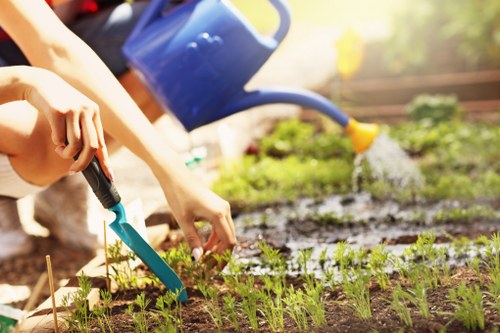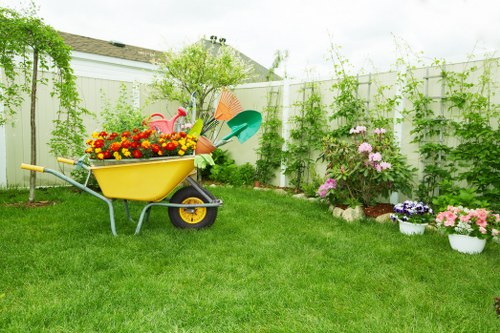Effective Driveway Algae Removal in Walthamstow

Maintaining a clean and safe driveway is essential for any property owner in Walthamstow. Algae growth on driveways is a common issue, especially in damp and shaded areas. Not only does algae make your driveway slippery and hazardous, but it also detracts from the overall appearance of your home.
Understanding the causes of algae growth is the first step towards effective removal. Algae thrives in moist environments with limited sunlight, which are typical conditions for many driveways in the Walthamstow area.
Fortunately, there are several methods and treatments available to eliminate algae and prevent its recurrence. In this article, we will explore the most effective strategies for driveway algae removal in Walthamstow, ensuring your driveway remains safe and visually appealing.

Understanding Driveway Algae
Algae is a simple plant that thrives in moist, shaded environments. On driveways, algae can appear as green or black spots, making surfaces slippery and increasing the risk of accidents.
Common Causes:
- High humidity and frequent rainfall
- Shade from trees and buildings
- Poor drainage around the driveway
- Organic debris accumulation
Addressing these factors is crucial in preventing algae from taking hold and spreading across your driveway.

Methods for Algae Removal
There are various techniques to remove algae from driveways, each with its own benefits and considerations.
1. Pressure Washing
Pressure washing is one of the most effective methods for removing algae. The high-pressure water jets can eliminate algae buildup without damaging the driveway surface.
Steps:
- Clear the driveway of any debris.
- Use protective gear, including gloves and goggles.
- Start washing from the highest point and work your way down.
- Rinse thoroughly to remove all loosened algae.

2. Chemical Treatments
Chemical cleaners specifically designed for algae removal can be highly effective. These solutions penetrate the algae, breaking it down for easy removal.
Safety Tips:
- Wear appropriate protective gear.
- Follow the manufacturer's instructions carefully.
- Ensure proper ventilation if applied in shaded areas.

3. Natural Remedies
For those who prefer eco-friendly solutions, natural remedies like vinegar or baking soda can be used to remove algae.
Note: While these methods are safer for the environment, they may require more effort and time compared to chemical treatments.
Preventing Algae Growth
Prevention is always better than cure. Implementing the following measures can help keep your driveway algae-free:
- Ensure proper drainage to reduce moisture accumulation.
- Trim surrounding vegetation to increase sunlight exposure.
- Regularly clean and seal your driveway to create a barrier against algae growth.
- Use eco-friendly sealants that discourage algae development.
Choosing the Right Service in Walthamstow
When selecting a professional service for algae removal, consider the following:
- Experience and expertise in driveway maintenance.
- Use of environmentally friendly products.
- Positive customer reviews and testimonials.
- Competitive pricing and transparent quotes.
Service Areas Around Walthamstow
Our comprehensive algae removal services are available not just in Walthamstow but also in the surrounding areas:
- Leyton: Just southwest of Walthamstow, Leyton offers a similar climate conducive to algae growth.
- Highams Park: Known for its lush greenery, Highams Park residents often require specialized algae removal services.
- Homerton: Close to Walthamstow, Homerton benefits from our quick and effective driveway cleaning services.
- Chingford: Northeast of Walthamstow, Chingford’s driveways face comparable algae challenges.
- Stratford: East of Walthamstow, Stratford combines urban living with the need for regular driveway maintenance.
- Lower Edmonton: Southeast of Walthamstow, Lower Edmonton features driveways that are prone to algae in damp conditions.
- Bruce Grove: A bustling area near Walthamstow, Bruce Grove driveways benefit from our efficient cleaning services.
- Upper Clapton: Adjacent to Walthamstow, Upper Clapton requires regular upkeep to prevent algae buildup.
- Stamford Hill: North of Walthamstow, Stamford Hill’s driveways are ideal candidates for our algae removal techniques.
- White Hart Lane: Close to the heart of Walthamstow, White Hart Lane residents can rely on our prompt services.
- Forest Gate: West of Walthamstow, Forest Gate’s driveways benefit from our specialized cleaning methods.
- Manor House: A short distance from Walthamstow, Manor House neighborhoods enjoy our comprehensive driveway care.
- Wickford: Similar to Walthamstow, Wickford driveways often require thorough algae removal solutions.
- Leytonstone: South of Leyton, Leytonstone’s driveways are well-maintained with our effective algae treatments.
- South Tottenham: Northeast of Walthamstow, South Tottenham driveways stay algae-free with our regular services.
Why Choose Professional Services?
While DIY methods can be effective, hiring professionals ensures thorough and lasting results. Professional services offer:
- Expertise in identifying and treating all types of algae.
- Access to specialized equipment and high-quality cleaning agents.
- Time-saving solutions that allow you to focus on other priorities.
- Guarantees for the work performed, providing peace of mind.
Conclusion
Algae on your driveway not only poses safety risks but also diminishes the curb appeal of your property. By understanding the causes and implementing effective removal and prevention strategies, you can maintain a clean and safe driveway in Walthamstow.
Whether you choose DIY methods or professional services, addressing algae growth promptly ensures your driveway remains in excellent condition all year round.
Frequently Asked Questions
1. How often should I clean my driveway to prevent algae growth?
Regular cleaning, at least twice a year, helps prevent algae buildup. However, areas with high moisture may require more frequent maintenance.
2. Are there eco-friendly solutions for algae removal?
Yes, natural remedies like vinegar and baking soda are effective eco-friendly options. Additionally, many professional services use environmentally safe products.
3. Can algae damage my driveway permanently?
Prolonged algae growth can lead to surface deterioration, making the driveway slippery and potentially causing cracks over time.
4. Is pressure washing safe for all types of driveways?
Pressure washing is generally safe for most driveway materials, including concrete and asphalt. However, it's essential to adjust the pressure to avoid damaging the surface.
5. How can I prevent algae from returning after removal?
Improving drainage, increasing sunlight exposure, and regularly sealing your driveway are effective measures to prevent algae recurrence.


